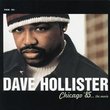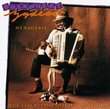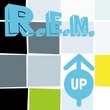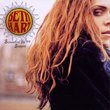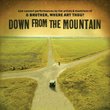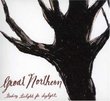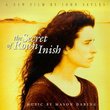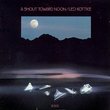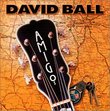| All Artists: Rasputina Title: How We Quit the Forest Members Wishing: 1 Total Copies: 0 Label: Sony Original Release Date: 8/4/1998 Release Date: 8/4/1998 Genres: Dance & Electronic, Alternative Rock, Pop, Rock Styles: Ambient, Goth & Industrial, Dance Pop Number of Discs: 1 SwapaCD Credits: 1 UPCs: 074646895429, 074646895443 |
Search - Rasputina :: How We Quit the Forest
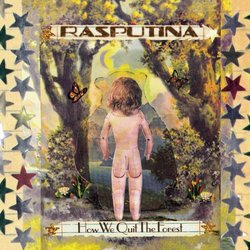 | Rasputina How We Quit the Forest Genres: Dance & Electronic, Alternative Rock, Pop, Rock
You can litmus-test yourself with the name alone. If you don't appreciate the stained-glass humor of a trio of corseted female cellists warping the moniker of the Mad Monk, chances are you're going to despise the creepy, G... more » |
Larger Image |
CD DetailsSynopsis
Amazon.com You can litmus-test yourself with the name alone. If you don't appreciate the stained-glass humor of a trio of corseted female cellists warping the moniker of the Mad Monk, chances are you're going to despise the creepy, Gothic-edged sonatas on this sophomore CD, easily one of the year's most curious releases. Get the gag? Good. You're in for one hell of a strange sonic trip, with campy bandleader Melora Creager as your wisecracking guide. "Strange" as in a nimble plucking of Lesley Gore's "You Don't Own Me" chestnut. Or an intensely fiddled send up of the DeBeers jewelry commercial, "Diamond Mind," with Creager commanding: "I want that diamond!/I want that thing!/A tennis bracelet, a ring!" Elsewhere, the disc is alternately jarring ("LeechWife," "Olde HeadBoard") and gentle ("Rose K," "Herb Girls of Birkenau"). Creager's subject matter gets downright sinister at times. Where else can you hear yarns concerning the ancient medical practice of leech application? Heel to shovel, Creager digs deep into the catacombs of the surreal until you have no choice but to dig Rasputina. --Tom Lanham Similar CDs
Similarly Requested CDs
|
CD ReviewsRasputina's best album after Thanks for the Ether trypanophobic34 | 04/16/2006 (4 out of 5 stars) "How We Quit the Forest, Rasputina's second full-length album, doesn't have so much the melancholy quality that Thanks for the Ether does. Several of the songs are also more mellow than those on Thanks for the Ether, but How We Quit the Forest sounds much more like rock overall, although it is still of its own original genre and certainly cannot be called rock. Those who classify How We Quit the Forest as rock and Thanks for the Ether as "goth" are simply lazy and eager for easy labels. How We Quit the Forest uses much distortion, giving it a more grating, electronic, rock-like sound, and odd sound effects (such as the duck call on "LeechWife"). While several of the songs on Thanks for the Ether are based tightly on historical events, the stories in How We Quit the Forest tend to be more fictional or spoofy. The lyrics are also less enigmatic, cleverly ironic, and insightful; Melora seems to have taken an overall simpler, goofier direction with them. Even the "joke songs" are sillier and less interesting. Since I love the melancholy, ethereal, "organic" sound of Thanks for the Ether and the wonderful stories behind it, I can't say that this album or, in fact, any of Rasputina's other albums, is better than their first, but How We Quit the Forest is my second in preference, and as a work of art it's still pretty interesting, creative, and sometimes emotive. Many people like it better than Thanks for the Ether; many probably don't. I suppose you'd just have to find out for yourself. Here's my impression of the songs: The Olde HeadBoard - One of the more rock-ish songs. Nearly impossible to make sense of the relation of the "old headboard" to the narrator and the situation she describes. Melora explains, on the concept of the song: "I think something a lot of people do that I do, and have done, is that you're with somebody new and you just make up who they are. All these wonderful things that might not have any bearing on reality. It's kind of like building a person." The notes for the music video also mention that "Fantasy people are much harder to get over. Especially when you have a big imagination." They made a lovely, colorful music video for this song (the only one they ever made, I believe), which you can find at www.waterstained.com. Not my favorite song on the album, I'd say, but a sort of nice one to open with, and I guess it's one of the "catchier" songs that are always strategically placed towards the beginning of albums. LeechWife - Again, rock-like. Quirky sound effects and fake cheering in the background. This song is about a little girl deciding to become a "leechwife," and features the kind of anachronistic combining of antique subjects with modern language (for example, phrases such as "You don't need no New Age crap") that is associated with Rasputina. You Don't Own Me - A slowed-down cover. About a young woman who enjoys her freedom telling her boyfriend or the men she dates in general not to tell her what to do or say or put her on display. The New Zero - My favorite song on the album. It is sweet and sad and tells an engaging story. Her voice is small and mellow on this one and not as shrill as it almost annoyingly is on some of the other songs. About an Abominable Snowman-esque creature whom I tend to think of as a cyborg-wolf-seal-made-of-many-incongruous-parts-type thing and his escaping from the harsh ostracism of society to an ice hotel with a girl (either friend or lover, but I initially thought of her as a little misfit girl and that he might even be her imaginary friend). You get the feeling towards the end that they let themselves drift away, possibly into death. It's not exactly that they let themselves go; it's just that they didn't really care enough to forcibly stay ("I really don't care, and neither does he/If this hotel melts into the sea/Polished and so rare, this way that we see/The coldness helps, it's our favorite remedy"). Rose K. - This is a moving song about the pain of old age and its accompanying physical and mental deterioration (not even being able to remember the life you used to have, etc.), and not so much about Rose Kennedy herself as anyone going through that. It's soft and vaguely wistful, and not mocking at all. DwarfStar - One of the joke songs that aren't semi-serious (like the ones on Thanks for the Ether, such as "The Donner Party") but aren't funny, either. I usually skip this one. Signs of the Zodiac - A very sad and touching song, even with its rather impersonal tone. Melora has a way of just telling a story and being somewhat removed from it yet conveying its sadness and making you feel the sympathy that should accompany it. It's about a man who's just had a heart attack and is in the hospital, surrounded by his family and friends, and our inability to predict or prevent these events, no matter how neat or orderly we might try to make our lives ("Do you believe in the signs of the zodiac?/Haven't you found that the systems for planning always fail?/Can you avoid what gave Daddy his heart attack?/Have you tried everything, anything, all to no avail?"). TrenchMouth - A catchy, mocking song about a white-trash, Dixie flag-waving, no-good brother who has abandoned his little sister, the narrator. Probably the most rock-ish song on the album. Herb Girls of Birkenau - One of the serious, sincere songs. About victims of Josef Mengele (the Nazi physician who performed cruel and unusual experiments on Jews) in the concentration camp of Birkenau, and is based on a Holocaust survivor's account. Melora says about her inspiration for the song: "[The author] was working in the field or something and saw, rising over the hill, a perfect line of perfectly clean, shaven-headed women with aprons, picking herbs, with the most lifeless, soulless, zombielike eyes. [You have] the contrast of perfectly pressed aprons, picking herbs on a beautiful day... It was a chance for me to write a song dealing with that without making fun of it. In fact, I tried to make it a heartfelt, serious song, without being goofy at all. I'm interested in extremes of mind and how people respond when they suffer like that." MayFly - To be honest, this was one of the songs I usually skipped. Musically, it is not very interesting or noticeabe, but conceptually, it is. Melora says: "Yeah, that is heartfelt--and it's kind of existential and serious with very light, almost dated dance music as the [setting]. When I was in high school, I heard, 'Oh, the mayfly, it lives only one day; there's no purpose to its life.' And that was the first time I ever thought, 'What is the purpose to our life?' [laughs] Do we have one? And I think [our life] is the same thing; it's just longer and it probably feels the same to the mayfly as to us, and...that's okay with me!'" So take a closer look at this song. I really like the idea behind it and its approach to the life of the mayfly. Christian Soldiers - One of the joke songs that must be skipped. I can hardly tolerate this one. Things I'm Gonna Do - I like the lyrics and her vocals on this song. It's about someone who yearns to "spit in the face of a tried and true one." "My cave is lit with tiny lights/I climb the stairs and catch the sight/Of other people far below/I've heard of them, they think they know/I make no friends, I've got no spark/In my defense, I take apart/What's put together easily/This is all true, I'll make it be" Diamond Mind - A funny parody of diamond jewelry commercials. It is basically spoken from the perspective of a greedy woman who is pressuring her fiance/husband to get her a diamond with classical cello skillfully weaving in the background. Clever how the music matches the tone of the woman (when she starts talking louder and faster, the playing becomes more furious, etc.). How We Quit the Forest - A more "organic" song telling the story of an ostrich, an egret, and a peacock living in the same hut in the forest. The "forest" is a metaphor for society, the animals that inhabit it are the various members of society, and "quitting the forest" suggests mentally quitting the social rules, customs, and norms that normally dictate us when we allow them to, and coming more fully into one's individuality. The ostrich and the egret rent their flat to another bird, the peacock, considering that although "his belongings were meager...he was pretty, would bring good luck." Initially they have all these ideas about getting along fabulously with the peacock ("they would sing songs all around the piano and do the cakewalk"), but soon they find out that he's different from them, though not necessarily in a good way, because all three are quite petty and small-minded. Having to deal with economic pressures, they let him stay because he's worth the money, but "so still they sat by the fireplace, silent/A chill ran through them." Most of the song is just about the three birds, but there is an outside narrator observing them all in their foolishness and plight and I believe that the ending lines ("The scene wasn't what it used to be/The scene is never what it used to/So that's how we quit the forest") are referring to Rasputina themselves and their individuality. It's as though they are recalling having observed the members of society like the ostrich, the egret, and the peacock and decided that this was all silly and that they wanted to do something different. A little gem of an allegory here. Worthy of giving the album its title. Watch T.V. - This is about someone who's lost a brother (I don't think in the sense that he died) and is sort of in denial or delusion. She just sits and watches TV all day, and is waiting for him to come back to her. He was the golden child, the "star" of the family as well as on TV, "the one who always smiled and talked for half an hour/Always new." Reminds me a little of "TrenchMouth" just because it's about a brother who deserted her and disappointed her in some way. A soft, gentle song concluding the album. My favorite songs on this album would be "The New Zero," "Rose K.," "Signs of the Zodiac," "Herb Girls of Birkenau," "Things I'm Gonna Do," "How We Quit the Forest," and maybe "TrenchMouth." I do think that the softer, mellower songs are more the keepers. If you like Rasputina, you'll like this album. However, I think of Thanks for the Ether as the more adventuruous and complex album, with better lyrics and (or possibly just more noticeable) cello playing. It was just cellos and drums then, but now the band has taken a different direction that never really returns to the melancholy, completely instrumental sound it had on Thanks for the Ether. This review better have been helpful; I spent ages writing it!" Fantastic album one of the very best i've ever heard. yahwehadonai | Olathe, KS United States | 12/19/2001 (5 out of 5 stars) "Rasputina are brilliant. The music is incredible, and the lyrics are delightfully quirky. Every song is excellent and the narrations Dwarf Star, and Christian Soldiers are quite humourous. For the most part each song is upbeat but after awhile you realize that there is something sinister buried with in them. The lyrics are often satyrical but in a dark way, and The Herb Girls of Birkenau is haunting and unspeakably brutal. The music on this album is predominantly cello and drum but the cellos come off sounding like bass guitar. When all blended together you sense the beautiful melody but feel the crushing power. It is like a fusion of classical and industrial. Much better than Thanks for the Ether (which is still quite good). This album holds its own against most of the things i listen too (Manson, Cradle of Filth, Dimmu Borgir)and is far and away better than damn near all of the crap marketed today." "You were the one that gave me all my answers..." Maarz | USA | 10/03/2004 (5 out of 5 stars) "I can't believe it. I'd listened to all of their other CD's before getting "How We Quit the Forest" because I was skeptical. It's out of print and the people who sell it ask a lot. I'm to big of a fan not to listen to it, so I finally got it and the moment I heard it I was in awe. "How We Quit the Forest" is the most mature albumn the band has produced, I think, and far surpases "Thanks for the Ether" and even "Frustration Plantation" which is amazing as well. How this incredible record went out of print is beyond me, because each song is more precious than the next.
"The Olde Headboard" The opening song is thrilling and done like a rock and roll band with distortions on the cellos (it all started here). "Leechwife" is even better with the audience in the background roaring and getting your blood pumping. They sing here about learning the trade of sucking out illnesses via leech. Very clever. "You Don't Own Me" I believe is a remake about a girl telling her guy to lighten up! Groovy any mellow and very smart! "New Zero" a curious story of being differnt in this world through the eyes of a... Werewolf of some sort? The CD's best moments are it's thoughtful pieces though, like the story of "Rose K." An old woman who has lost her memory, the song states perfectly "They say that a rose is a flower and that it is red; it blooms, it grows, it wilts and then it is...dead." "Dwarf Star" A tale of the Dwarf star, who was rude and not very nice. A strange song, expiremental, but it grows on you despite the weird vocals and cello parts. "Signs of the Zodiac" Is one of my favorites. It's from the P.O.V. of one watching a grieving person and telling them that we can't predict what is going to happen and that we need accept help when bad things do happen. "Trenchmouth" The story of a brother who went missing, he worked for the FDA. Catchy and fast, very good. One of the hippist songs on the CD, I don't know a person who doens't like this one. "Herb Girls of Birkenou" Sad and creepy. My friend described it as a funeral march, but I think it's more than that. It's a question on how such terrible things can happen as what happened to the herb girls. Also it's very pretty and dramatic. Nice! "Mayfly" Oh fly of may, you live one day... Peppy, simple, the optomistic music and the simple lyrics flow together wonderfully to form almost a sense of waste. Very pretty and fun. "Christian Soldiers" Ah, an essay to the tune of the hymn, this song tells of the midevil exocists and their practices, accompanied by a possesed voice telling them "no! Nooo!" Creepy and addictive @_@ "Things I'm Gonna Do" is another remake (positively) and is just PERFECT! The timing of calming the cellos and then errupting them in an explosion of entoxicating strains if brilliant. The vocals on this piece are also done exceptionally well. "Diamond Mind" Is a witty bit that makes a man pray his wife never becomes like the obsessed woman screaming "Gimme the Goddamn Diamond!" "How We Quit the Forest" is sad and realist at it's veiw of hard times, told via Ostrich, Egret and Peacock (who should have brought good luck to the others). "Watch T.V." Is the last and best song on the album. I would pay fifty dollars for this song alone it is so pretty and nostolgic- along with being one of the few modern themed songs of Rasputina. The song is about someone watching the television to find the person they love, but they've disappeared and are lost. Touching and done with beautiful piano work this song makes this albumn complete and by far tips the scales to make it their best." |

 Track Listings (15) - Disc #1
Track Listings (15) - Disc #1